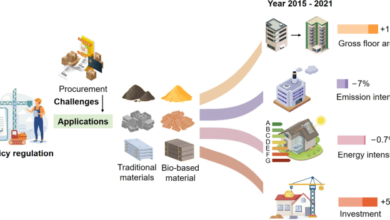Beyond 2024: Navigating the Future of Internet Marketing

In the dynamic world of digital marketing, staying ahead of the curve is essential. As we look beyond 2024, several emerging trends and strategies promise to reshape how businesses reach and engage their audiences. This blog post will guide digital marketers and business owners through the facets of modern internet marketing that are set to dominate the landscape.
Image source: pixabay.com
The Rise of AI in Digital Marketing
Artificial Intelligence (AI) is revolutionizing numerous industries, and digital marketing is no exception. AI enables marketers to analyze vast amounts of data to gain insights into customer behavior and preferences. According to a leading internet marketing agency— tools like chatbots can enhance customer service by providing instant responses to queries.
Implementing AI in your marketing strategy involves selecting the right tools. Platforms like Google’s AI and IBM Watson offer solutions for data analysis and customer interaction. By integrating these tools, businesses can provide personalized experiences that resonate with their audience.
AI-powered content creation tools like Jasper.ai allow marketers to generate relevant content quickly. This not only saves time but also ensures that the content is tailored to the needs of the audience.
Personalization at Scale
Personalization has been a buzzword for years, but its application is evolving. Beyond 2024, personalization will move from a nice-to-have to a must-have in marketing strategies. Consumers expect brands to understand their preferences and deliver tailored experiences.
To implement personalization at scale, start by collecting data on customer behavior. Use this data to segment your audience into different groups based on common characteristics. Tools like HubSpot and Salesforce can help automate this process.
Once segmented, create personalized content for each group. This could be in the form of personalized emails, product recommendations, or targeted ads. The key is to make each customer feel valued and understood.
The Power of Video Marketing
Video content continues to dominate online platforms and marketing services, and its importance is only set to grow. Videos are engaging and can convey complex information in an easily digestible format. Platforms like YouTube, TikTok, and Instagram Reels offer opportunities for brands to connect with their audience.
Creating effective video content involves understanding your audience’s preferences. Short, engaging videos tend to perform well on social media, while longer, informative videos are suitable for platforms like YouTube.
Invest in quality production to ensure your videos stand out. Use storytelling techniques to make your videos memorable and include clear calls-to-action to drive engagement.
Voice Search Optimization
With the increasing popularity of smart speakers and voice assistants, optimizing for voice search is becoming crucial. Voice search queries differ from text searches; they are usually longer and more conversational.
To optimize for voice search, focus on long-tail keywords and natural language. Create content that answers common questions your audience might ask. Tools like AnswerThePublic can help identify these questions.
Ensure your website is mobile-friendly and loads quickly, as these factors influence voice search rankings. Additionally, consider creating a FAQ page to address common queries directly.
Social Commerce
Social media platforms are transforming into full-fledged e-commerce hubs. Features like Instagram Shopping and Facebook Marketplace allow users to purchase products directly from their social media feeds.
To leverage social commerce, Thrive Social Media Marketing Agency advises ensuring your products are easily discoverable on social media. Use high-quality images and engaging descriptions to attract attention. Collaborate with influencers to reach a wider audience and build credibility.
Integrate social commerce tools with your existing e-commerce platform for seamless transactions. Track performance metrics to understand what resonates with your audience and adjust your strategy accordingly.
Blockchain Technology
Blockchain technology is often associated with cryptocurrencies, but its applications extend far beyond. In digital marketing, blockchain can enhance transparency and security in online advertising.
Blockchain allows for secure tracking of ad impressions and clicks, reducing the risk of fraud. It also enables transparent contracts between advertisers and publishers, ensuring fair compensation.
Consider exploring blockchain-based ad networks like Brave and Bitclave. These platforms prioritize user privacy while delivering targeted ads, creating a win-win situation for both businesses and consumers.
Interactive Content
Interactive content, such as quizzes, polls, and interactive infographics, can significantly boost engagement. This type of content encourages active participation, making it more memorable and shareable.
To create interactive content, consider using tools like Outgrow or Typeform. These platforms offer templates for various types of interactive content, making the creation process straightforward.
Incorporate interactive elements into your existing content strategy. For example, add a quiz at the end of a blog post to test readers’ knowledge or create a poll to gather feedback on a new product idea.
Augmented Reality (AR)
Augmented Reality (AR) is transforming the way consumers interact with products online. AR allows customers to visualize products in their real-world environment, enhancing the shopping experience.
Retailers like IKEA and Sephora use AR apps to help customers make informed purchase decisions. Implementing AR in your marketing strategy can set your brand apart from competitors and drive sales.
Consider developing an AR app or partnering with platforms that offer AR integration. Promote your AR capabilities through social media and email marketing to attract tech-savvy customers.
Ethical Marketing
Consumers are increasingly aware of ethical considerations and expect brands to align with their values. Ethical marketing involves promoting products and services honestly and transparently, without exploiting customers.
To practice ethical marketing, prioritize honesty in your messaging. Avoid misleading claims and be transparent about your business practices. Highlight your company’s commitment to social and environmental causes.
Engage with your audience on social media to build trust and foster a sense of community. Respond to feedback promptly and take responsibility for any mistakes.
Data Privacy
With growing concerns over data privacy, businesses must prioritize protecting their customers’ information. Compliance with regulations like GDPR and CCPA is essential for maintaining customer trust.
Implement robust data security measures to protect sensitive information. Regularly update your privacy policy and ensure it is easily accessible to customers.
Educate your audience about how their data is used and give them control over their information. Transparency in data practices can enhance trust and loyalty.
Micro-Moments
Micro-moments refer to the brief instances when consumers turn to their devices for quick answers or solutions. These moments are critical touchpoints in the customer journey and present opportunities for brands to connect with their audience.
To capitalize on micro-moments, ensure your content is easily accessible and provides immediate value. Optimize your website for mobile devices and prioritize fast loading times.
Create content that addresses common questions and needs at each stage of the customer journey. Use tools like Google Analytics to identify popular search queries and tailor your content accordingly.
Influencer Marketing Evolution
Influencer marketing has evolved from partnering with celebrities to collaborating with micro-influencers who have smaller but highly engaged followings. These influencers can provide authentic endorsements that resonate with their audience.
When selecting influencers, prioritize those whose values align with your brand. Look for engagement metrics rather than follower count to ensure genuine influence.
Develop long-term relationships with influencers to create consistent and authentic content. Provide them with creative freedom to ensure their endorsements feel natural and trustworthy.
Summing Up
As we venture into the future of internet marketing beyond 2024, it’s clear that innovation and adaptability are key. From AI and personalization to ethical marketing and data privacy, the landscape is continuously evolving. By staying informed and embracing these trends, digital marketers and business owners can position themselves for success.
Explore these strategies and incorporate them into your marketing plan to stay ahead of the competition. Whether you’re optimizing for voice search or experimenting with AR, the possibilities are endless. Stay curious, stay innovative, and watch your business thrive in the digital age.
Keep an eye for more news & updates on UsaTechMagazine.Com!





